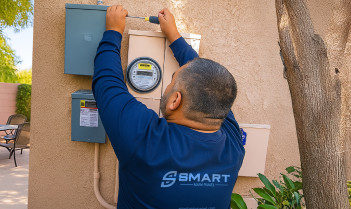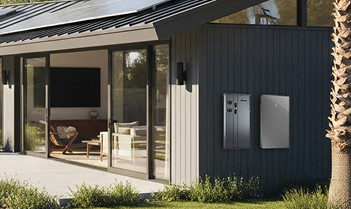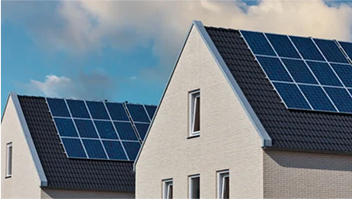Date
Smart Panels Provide Deep Analytics into Home Energy Usage
Smart panels are revolutionizing the way homeowners understand and optimize their energy usage. These innovative panels offer deep analytics and insights into how energy is being consumed in the home, providing valuable data for informed decision-making. By monitoring energy usage in real-time, homeowners can identify areas of inefficiency, lower costs, and maximize energy efficiency.
Key Takeaways:
- Smart panels offer homeowners a deep understanding of their energy usage.
- Real-time monitoring allows homeowners to identify areas of inefficiency and optimize energy consumption.
- Access to detailed analytics empowers homeowners to make informed decisions to reduce their carbon footprint and improve energy efficiency.
- By analyzing energy usage data, homeowners can unlock cost savings and improve the performance of appliances and systems.
- Smart panels provide easy access to empirical data and trends, enabling homeowners to track their progress and set energy reduction goals.
The Benefits of Home Energy Analytics
Home energy analytics offer a range of benefits for homeowners. By analyzing energy usage data, you can gain valuable insights into your energy consumption patterns and make informed decisions to optimize usage and reduce costs. Here are some key benefits of utilizing home energy analytics:
- Cost Savings: By identifying areas of inefficiency and implementing energy-saving strategies, you can significantly reduce your energy bills. Home energy analytics provides data-driven insights that can help you make smarter choices about energy consumption, leading to long-term cost savings.
- Efficiency Improvements: Understanding how energy is being used in your home allows you to identify and address any inefficiencies or maintenance needs. By optimizing the performance of appliances and systems, you can improve energy efficiency and reduce waste.
- Environmental Impact: By reducing your energy consumption, you can contribute to a more sustainable future. Home energy analytics empowers you to track your carbon footprint, set goals for energy reduction, and measure the effectiveness of your energy-saving efforts.
Home energy analytics offers homeowners the opportunity to take control of their energy usage, leading to significant cost savings, efficiency improvements, and a reduced environmental impact.
In conclusion, home energy analytics provides valuable usage data that can lead to cost savings, efficiency improvements, and a reduced environmental impact. By analyzing this data, you can make informed decisions about energy consumption and implement strategies to optimize your energy usage. With the benefits of cost savings, efficiency improvements, and a reduced environmental impact, home energy analytics is a valuable tool for homeowners looking to take control of their energy consumption.
| Benefit | Description |
|---|---|
| Cost Savings | By identifying areas of inefficiency and implementing energy-saving strategies, homeowners can significantly reduce energy bills. |
| Efficiency Improvements | Understanding energy usage allows homeowners to optimize appliance and system performance, improving energy efficiency. |
| Environmental Impact | By reducing energy consumption, homeowners can contribute to a more sustainable future and track their carbon footprint. |
How Smart Panels Work
Smart panels are revolutionizing the way homeowners monitor and manage their energy usage. These advanced panels are equipped with cutting-edge technology that allows real-time monitoring of energy consumption in the home. By providing detailed insights into energy data, smart panels enable homeowners to make informed decisions and optimize their energy efficiency.
The Functionality of Smart Panels
At the heart of smart panels are advanced sensors that collect energy data from various sources in the home. These sensors are typically installed at the main electrical panel and connect to the home’s electrical system. They capture real-time information on energy consumption, allowing homeowners to track their usage with precision.
The data collected by smart panels goes beyond just overall energy consumption. These panels can provide detailed information on the energy usage of individual appliances and systems in the home. This level of granularity allows homeowners to pinpoint areas of inefficiency and identify opportunities for improvement.
Real-Time Monitoring and Access to Energy Data
One of the key features of smart panels is their ability to provide real-time monitoring of energy usage. Homeowners can access their energy data instantly through user-friendly interfaces, such as mobile apps or web portals. This accessibility empowers homeowners to track their energy consumption at any time and make adjustments as needed.
With the detailed energy data provided by smart panels, homeowners can gain valuable insights into their energy usage patterns. This data allows them to identify trends, understand peak usage times, and make informed decisions about energy-saving strategies. By leveraging the information provided by smart panels, homeowners can optimize their energy consumption and reduce their environmental impact.
Table: Benefits of Smart Panels
| Benefits | Explanation |
|---|---|
| Real-time monitoring | Track energy usage at any time and make adjustments as needed |
| Granular data | Detailed insights into energy usage by individual appliances and systems |
| Optimization opportunities | Identify areas of inefficiency and make informed decisions to improve energy efficiency |
| Environmental impact | Reduce carbon footprint and contribute to a more sustainable future |
Overall, smart panels offer homeowners a powerful tool to gain control over their energy consumption. By providing real-time monitoring, granular data, and access to energy insights, these panels empower homeowners to optimize their energy usage, reduce costs, and contribute to a greener planet.
Optimizing Home Energy Efficiency
When it comes to energy efficiency, smart home technology has revolutionized the way homeowners can optimize their energy usage. By leveraging the power of smart panels and home energy analytics, you have the ability to take control of your energy consumption and implement effective energy-saving strategies. By doing so, you can not only reduce your carbon footprint but also save on energy costs.
One of the key advantages of smart home technology is its ability to provide real-time data on energy consumption. Smart panels collect data from various sources and offer detailed reports and insights. This data empowers you to track your energy usage, identify areas of inefficiency, and make informed decisions to optimize your energy efficiency. For example, by analyzing the data, you may discover that certain appliances are consuming more energy than others, allowing you to adjust your usage habits or replace them with more energy-efficient models.
Additionally, smart home technology enables you to automate energy usage through the integration of smart devices and systems. By connecting your appliances, thermostat, and lighting to a central smart home hub, you can create schedules, set energy-saving modes, and control your energy consumption remotely. This level of control and automation not only enhances the convenience of managing your home’s energy but also ensures that you maximize energy efficiency by minimizing unnecessary consumption.
Energy-Saving Strategies
Achieving optimal energy efficiency goes beyond technology alone. It also involves adopting energy-saving strategies that complement your smart home setup. Here are some strategies you can implement:
- Adjusting your thermostat settings: Lowering your thermostat by just a few degrees in the winter or raising it in the summer can have a significant impact on your energy consumption.
- Using energy-efficient appliances: Upgrading to ENERGY STAR certified appliances can help reduce energy waste and lower your electricity bills.
- Improving insulation: Proper insulation in your home can prevent energy loss and keep your indoor temperature stable.
- Maximizing natural light: Utilizing natural light during the day reduces the need for artificial lighting, saving both energy and money.
By combining these energy-saving strategies with the power of smart home technology and home energy analytics, you can create a highly efficient and sustainable living environment. Remember, small changes can make a big difference when it comes to energy efficiency.
| Energy-Saving Strategy | Benefits |
|---|---|
| Adjusting thermostat settings | – Reduces energy consumption – Lowers energy bills |
| Using energy-efficient appliances | – Reduces energy waste – Lower electricity bills |
| Improving insulation | – Prevents energy loss – Maintains stable indoor temperature |
| Maximizing natural light | – Reduces the need for artificial lighting – Saves energy and money |
The Role of Data in Home Energy Analytics
Data analysis is at the heart of home energy analytics, providing valuable insights and trends that empower homeowners to make informed decisions about their energy consumption. By collecting and analyzing empirical data on energy usage, smart panels offer homeowners a deeper understanding of how energy is being utilized within their homes. This data-driven approach allows homeowners to identify patterns, spot inefficiencies, and optimize their energy efficiency for cost savings and environmental benefits.
The Power of Insights
The data collected by smart panels enables homeowners to gain insightful information about their energy usage. By visualizing this data, homeowners can identify trends, such as peak energy consumption times or the impact of specific appliances on overall energy usage. Armed with these insights, homeowners can make data-driven decisions to optimize their energy consumption, leading to increased cost savings and reduced environmental impact. For example, if data analysis reveals that a certain appliance is consuming an excessive amount of energy, homeowners can take steps to limit its usage or invest in a more energy-efficient alternative.
Spotting Trends and Making Adjustments
The trends identified through data analysis can also help homeowners identify opportunities for further improvement. For instance, homeowners may notice that their energy usage spikes during specific times of the day or week. Armed with this knowledge, they can adjust their energy consumption habits by scheduling energy-intensive tasks during off-peak hours or implementing energy-saving strategies during times of higher energy demand. By making these adjustments based on data insights, homeowners can optimize their energy efficiency and reduce their environmental footprint.
| Benefits of Data Analysis in Home Energy Analytics |
|---|
| Empowers homeowners with empirical insights into energy consumption |
| Helps identify patterns, trends, and inefficiencies |
| Enables data-driven decisions for optimizing energy efficiency |
| Facilitates cost savings and reduced environmental impact |
Data-Driven Decision Making
Data analysis in home energy analytics enables homeowners to take a proactive approach to energy efficiency. By harnessing the power of empirical data, homeowners can set goals, track progress, and measure the effectiveness of their energy-saving efforts. For example, by comparing energy consumption data before and after implementing energy-saving measures, homeowners can quantify the impact of their actions and make necessary adjustments for continuous improvement. This data-driven decision-making process puts homeowners in control of their energy consumption and allows them to adopt sustainable practices that align with their goals.
The Future of Home Energy Analytics
The field of home energy analytics is on the brink of significant advancements and future trends. As technology continues to evolve, so does the potential for energy management in our homes. With the integration of home energy analytics into smart home systems, homeowners will have greater control over their energy usage and be able to make more informed decisions.
One of the major advancements expected in the future of home energy analytics is the development of a smart grid infrastructure. The smart grid will revolutionize how energy is distributed and consumed, allowing for more efficient and sustainable energy practices. This integration will not only benefit homeowners but also contribute to the overall stability and sustainability of the energy grid.
By harnessing the power of data analysis, future home energy analytics will provide homeowners with valuable insights into their energy consumption patterns. This empirical data will enable individuals to identify areas of improvement, set goals for energy reduction, and measure the effectiveness of their energy-saving efforts. With the continued evolution of data analytics techniques, the future of home energy analytics holds immense potential.
With advancements in technology and the increasing popularity of renewable energy sources, the future of home energy analytics looks promising. By integrating renewable energy generation with smart home systems, homeowners will have the opportunity to optimize energy usage and reduce their reliance on traditional energy sources. This shift towards sustainable energy management will not only benefit individual households but also contribute to a greener and more environmentally conscious future.
FAQ
What are smart panels?
Smart panels are innovative solutions that provide detailed analytics and insights into home energy usage. They monitor energy usage in real-time and offer homeowners empirical data and trends to make informed decisions about energy consumption.
What are the benefits of home energy analytics?
Home energy analytics allow homeowners to identify patterns and trends in energy usage, leading to significant cost savings by reducing energy waste and optimizing usage. It also provides insights into appliance performance and helps in addressing any inefficiencies or maintenance needs.
How do smart panels work?
Smart panels are equipped with advanced sensors and technology that monitor energy usage in real-time. Installed at the main electrical panel, they collect data from various sources and offer detailed reports and insights. Homeowners can access this data through a user-friendly interface via a mobile app or web portal.
How can I optimize home energy efficiency?
By analyzing energy usage data, homeowners can identify areas of inefficiency and implement energy-saving strategies such as adjusting thermostat settings, using energy-efficient appliances, upgrading insulation, and adopting smart home technology.
What role does data play in home energy analytics?
Data plays a crucial role in home energy analytics as it helps homeowners understand energy consumption habits, make data-driven decisions to optimize energy efficiency, track progress, set goals, and measure the effectiveness of energy-saving efforts.
What does the future hold for home energy analytics?
The future of home energy analytics is expected to see advancements in technology and data analysis. Integration into smart home systems will provide homeowners with a more comprehensive view of their energy usage. Additionally, the development of a smart grid infrastructure will enhance energy distribution and consumption.


